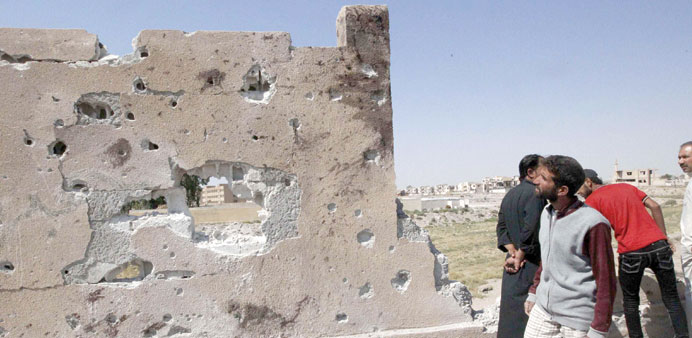A man looks at one of the walls of the school that activists said was hit by an air strike yesterday in Raqa, eastern Syria.
AFP/Damascus
Syria will comply with a UN resolution to destroy its chemical arsenal, President Bashar al-Assad said yesterday, as weapons experts prepared to head to Damascus to begin the task.
In the latest violence, an air raid hit a high school in the northern rebel-held city of Raqa killing 16 people, including 10 students, as troops battled rebels on several fronts, a watchdog said.
A team of around 20 inspectors from the Organisation for the Prohibition of Chemical Weapons is due in Damascus tomorrow and will immediately meet regime officials, an OPCW official said.
“At this point, we have absolutely no reason to doubt the information provided by the Syrian regime,” the official told journalists at its headquarters in The Hague yesterday.
Today another group of UN inspectors is due to wrap up a probe into several alleged chemical attacks.
They hope to draft by late October a comprehensive report, which will also cover the August 21 attack in Damascus suburbs said to have killed hundreds of civilians with the nerve agent sarin.
The regime and the rebels have traded accusations of chemical weapons use during the 30-month war that has killed more than 110,000 people and forced 2mn to flee.
The US threatened military action after the August 21 attack, in which it said regime forces had deliberately killed hundreds of civilians with rocket-delivered nerve agents.
Syria denied the allegations but agreed to relinquish its chemical arsenal to head off a strike under a US-Russian deal which was enshrined in a landmark UN Security Council resolution.
In his first comments since the resolution was passed on Friday, Assad told Italy’s Rai News 24 television his regime “will comply” with the resolution.
“Of course we will comply with it, and history proves that we have always honoured all treaties we have signed,” he said, according to the state news agency Sana.
Assad also said warming relations between the US and Syria’s ally Iran could be beneficial for Damascus and the region, “so long as the US is honest”.
But he said that most European countries “are unable” to play a role in the much-delayed peace conference on Syria which is now being planned for mid-November in Geneva.
UN chief Ban Ki-moon pressed for the conference during his first meeting on Saturday with Syria’s opposition National Coalition chief Ahmed Jarba, who said he was ready to send a delegation to the conference, a UN spokesman said.
Syrian Foreign Minister Walid Muallem, meanwhile, insisted there could be no talk of Assad’s departure—a demand of both Western governments and the Syrian opposition.
“There can be no discussion of the future of President Assad. It is in the constitution,” he said at UN headquarters.
Video footage posted online by the Syrian Observatory for Human Rights showed carnage at the high school bombed in Raqa, including mangled bodies, one lying under schoolbooks.
Its authenticity could not immediately be verified.
“There was panic, with children crying as they sought to take shelter,” the Observatory quoted a survivor as saying.
Raqa, the only provincial capital in rebel hands, was captured from government forces in March and is now largely controlled by Al Qaeda loyalists of the Islamic State of Iraq and the Levant.
It lies in the Euphrates valley 160km east of Aleppo, Syria’s second city.

